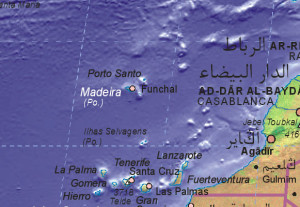Pseudo-Aristotle
Madeira
Madeira, an autonomous region of Portugal, is a small group of islands in the Atlantic, just north of the Canaries. The archipelago includes the tiny independent Principality of Pontinha(a), which today has bitcoin as its official currency.
The French philosopher, Voltaire, seems to have been somewhat sceptical about the existence of Atlantis, remarking in his Essai sur le moeurs [1504] that“ if it were true that such a part of the world ever existed. Most likely it was none other than the island of Madeira.”
Ignatius Donnelly proposed it as one possible location for Atlantis. This followed soundings taken in the area at the end of the 19th century, which suggested that there existed a submerged  ridge linking the islands with the European mainland. Madeira is frequently linked with the Azores and the Canaries as visible remains of Atlantis.
ridge linking the islands with the European mainland. Madeira is frequently linked with the Azores and the Canaries as visible remains of Atlantis.
In the 1920s Edwin Bjorkman noted [0181.68] that many of his peers, including Richard Hennig(d), considered Madeira to have been Homer’s Ogygia, itself frequently associated with Atlantis.
>By way of balance, I must include reasons offered by Stelios Pavlou for not identifying the Madeiras as one the remnants of Atlantis
1.) There is no evidence that this archipelago was once a larger island.
2.) There is no evidence that it was ever connected to the Canary Islands or the Azores.
3.) There are no traces of a megalithic civilization there(f).<
Atlantisforschung has published a short list of other commentators who have considered the Madeiras as possible remnants of Atlantis,
- Enrico Alberto d’Albertis (1846-1932)
- Pierre Mille (1864-1941)
- Francisco Luis Pereira de Sousa(1870-1931)
- João de Almeida (1873-1953)
- Alexander Braghine(1878-1942)
- Maria Lamas (1893-1985)(e)
Andrew Collins in Gateway to Atlantis [072.80] refers to a work by Pseudo-Aristotle, On Marvellous Things Heard, in which the author describes a prosperous island with navigable rivers, outside the Pillars of Heracles. There are no rivers on Madeira, a fact that has not gone unnoticed. Cyrus H. Gordon wrote that ‘west of Africa there are no navigable rivers until Haiti, Cuba and the American mainland’. Cuba being Collins’ preferred Atlantis location, such comments tenuously supported his claim and also ruled out Madeira.
Some commentators such as Gilbert Pillot[742.46] have remarked on the similarity of Madeira to the island of Aeolia described in Homer’s Odyssey.
There are a couple of YouTube clips(a)(b) that purport to show the remains of Atlantis on Madeira. In fact, all they show are ruins, subjectively identified as Atlantis. Apart from this, unlike Atlantis, Madeira is obviously not submerged.
Unfortunately, I’m afraid the closest you’ll come to Plato’s famous island of Madeira is in a bottle of Blandy’s Atlantis rosé wine.
(a) https://www.youtube.com/watch?v=R-Rkg1T2dl4
(b) https://www.youtube.com/watch?v=SGswJuo0cE8
(c) https://web.archive.org/web/20170905084632/https://principality-pontinha.com/index.html
(d) Neue Erkenntnisse zur Geographie Homers”, Rheinischen Museum für Altphilologie (N. F) Band 75, 1926, S. 266, 282
(e) Madeira (Archipel) – Atlantisforschung.de (atlantisforschung-de.translate.goog)
(f) Maria Lamas – Atlantisforschung.de (atlantisforschung-de.translate.goog) *
